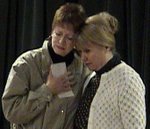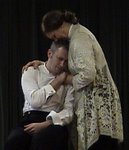David: Sorry I don’t have a review of Seagull !!
The Weir
Signal's The Weir opened last week to critics' raves and enthusiastic applause.
The Daily Herald's Barbara Vitello writes, "Prentice's discreet, graceful direction underscores a wonderfully understated production from Signal, a relative newcomer to the Chicago scene and a company that bears watching. So convincing is this well-acted, well-paced production, you might find yourself tempted to order a pint and join in the conversation that unfolds over the course of a stormy evening in this out-of-the-way pub in Northwest Ireland."
A "must see" show for
ChicagoCritic.com's Tom Williams, the play "features some of the finest ensemble performances I’ve seen on stage in quite awhile."
Jeff Recommended
"Features a note-perfect set by Melania Lancy and subtle, unhurried performances...— Reid, Chicago Reader
"This is a brilliant production of a fantastic play with five outstanding performances that unfolds as one mesmerizing night at the theatre. This is one of the finest plays of the year!" — ChicagoCritic.com
"John Zinn and Ted Hoerl anchor this amazing show. " -- Chicagocritic.com
"There’s Jack (Ted Hoerl, expertly tempering sarcasm with regret) a mechanic who opens the dam’s floodgates with a fairy story and closes them with a bittersweet, cautionary tale." -- The Daily Herald
"Hoerl, in particular, is in fine form as the cantankerous old man of the group." -- Time Out Chicago
"The players emote with such casual competence that you almost forget that they’re acting….Hoerl’s affectionate portrayal of Jack has an edge-worn, lived-in feel that rightly owns the show." -- Centerstagechicago.com
Rabbit Hole
Taken from the March 21, 2007 Illinois News Wire
Dan ZeffCopley News Service
Review of Rabbit Hole at the Goodman Theatre
CHICAGO - Why would anyone want to watch a play about two parents trying to deal with the grief of losing a child in an accident? If it's a play like Rabbit Hole, the rewards are considerable, thanks to sensitive and honest writing blended with humor, all presented in a flawless performance at the Goodman Theatre.
The David Lindsay-Abaire drama was a surprise hit on Broadway last year. Lindsay-Abaire made his reputation with a pair of absurdist comedy-dramas called Fuddy Meers and Kimberly Akimbo, neither of which prepared audiences and reviewers for the finely tuned realism and compassion of Rabbit Hole.
Given its off-putting subject matter, the play wasn't a candidate for a national tour. Goodman picked up the show for its subscription series, for which local theatergoers should give much thanks.
The storyline is simple. Howie and Becca are a thirty-something husband and wife living in the suburb of Larchmont, N.Y. As the play begins, it's been eight months since their only child, a 4-year-old boy named Danny, was killed by an automobile when he ran into the street to chase the family dog. The first scene is disarmingly light, with Becca bantering and bickering with her disheveled younger sister Izzy, who hasn't been able to get her life together and now finds herself pregnant.
The casual humor of the opening minutes gradually yields to a portrait of both Becca and Howie floundering emotionally as they grieve over their boy's death, each in his or her own way. Becca is tortured by reminders of the boy scattered throughout the home and even wants to sell the house. Howie treasures those reminders, whether they are a videotape of the boy just before his death or his childish paintings pasted on the refrigerator door. Becca's mother Nat adds to the emotional mix, a blunt woman still dealing with the suicide of her adult son 11 years ago.
The play is shot through with tensions among all the characters, including Izzy and Jason, the high school boy who drove the car that killed Danny. The marriage between Howie and Becca is under psychological siege. Both characters are locked in their own worlds of suffering and they often rub each other raw. Ironically, the flighty Izzy seems to grow in strength of character as her pregnancy advances.
To the playwright's credit, he offers no easy solutions or bogus happy endings to the agony of the bereaved parents. For them, a term like "closure" is psychobabble. They will never get over the death of their child, but in the play's final moment there is a hint that perhaps they can face their loss with a resolution that will preserve their marriage and their mental health.
In a play of this delicacy, the production is everything. One false note of melodrama or sentimentality would shatter the evening. The script must have been a scary project for director Steve Scott, but he rose to the challenge with a staging of sustained intensity, leavened with humor, that looks and sounds just right every moment.
The performances are beyond criticism. Each of the five characters comes across with realism, credibility and humanity. I can only speculate on the emotional toll the play must take on the cast each performance. But, they all seem born to play their roles. The obvious centerpieces of the ensemble are the actors who play the parents, yet I'll start with Jürgen Hooper, who makes three appearances as Jason, the young driver of the car that killed Danny. The boy is obviously suffering a misery of guilt and regret over the incident, but he speaks with an understatement that delivers more impact that any weeping or breast beating. Hooper's rendering of the boy's quiet pain is indelible.
Lia Mortensen plays Becca and Daniel Cantor plays Howie. Both capture the anger and frustration and agony of their situation without a misstep. Mortensen and Cantor create decent and intelligent people struggling to handle an appalling catastrophe, which at this time looks like a lifetime sentence of unending sorrow. They reach out for consolation but the ache and desperation are often just too much.
Mary Ann Thebus provides some welcome comic relief as Becca's outspoken mother trying to cope with her own demons in the loss of her son. Amy Warren, an actress on the rise in area theater big-time, is just right as Izzy, the disheveled sister who talks a lot of undiplomatic common sense to Becca and Howie.
Scott Bradley designed the bi-level set that authentically re-creates the kitchen and living room of the suburban home on the first level, with the bedroom of the dead child above. Birgit Rattenborg Wise designed the contemporary costumes, Robert Christen the atmospheric lighting, and Richard Woodbury provided the sound design and original music.
The show gets a rating of 3 1/2 stars.
Bernard Shaw’s State of the Union
Theatre Kingston's comedy sees two men - a poet, the husband - fight for Candida's love.
Madness - or rather the attribution of madness - appears as the lightest of comic leit motifs in George Bernard Shaw's Candida.
When a character's behaviour pushes beyond the borders of the conventional and the expected, he or she is quickly judged mad by those who db not comprehend it.
Prossy, the straight-laced. outspoken and love-struck secretary to Morell; Marchbanks, the naive, romantically obsessed but surprisingly resilient poet; Morell, the Christian clergyman and pious socialist whose other god is honesty and straight speaking; and Candida herself, Morell's eminently practical. managerial wife - none are immune from the allegation.
As Burgess, Candida's father, says, "Why, it must be catching! Four in the same house!"
These precipitous attributions of insanity give rise to some of the comedy in this pleasantest of Shaw's Plays Pleasant. But they also function as satiric Shavian fingerpointing at those who fail to understand his ideas. They serve, too, as a warning to his audiences that they must look beneath the surface to grasp the meaning of the conundrum presented in his play.
And what is the conundrum in Candida?
How is it, Shaw asks, that we are able to do good in the world? From where does the strength, the grace to do so, come? Does it come from being in the right and wielding the power and the authority that flows from being right? Or does it arise out of the love of one human being for another?
It is somewhat more than 100 years since Shaw wrote Candida. In Theatre Kingston's production of his play, the puzzle still intrigues and the working out of the resolution continues to delight.
Paula Schultz's Candida is a woman whom, in Morell's words, "Everyone loves... they can't help it." She is clear-headed, charming, tender, motherly and, when provoked, indignantly angry. Above all, she is sensible and practical. Schultz switches neatly from role to role and it is easy to see why she can become all things to all men.
However, Candida is placed on something of a pedestal. Much of the tension in the play arises from the fact that each man sees in Candida whatever he desires her to be.
Conflict is inevitable. and those who have the most invested in herthe parson and the poet - must do battle for her:
The Rev. James Mavor Morell is Candida's good-looking, vigorous, honey-tongued and charismatic husband. Passionately committed to the socialist cause, he thunders it from the pulpit and night after night whips up the members of various social action groups to enthusiastic applause.
Morell loves Candida; to him she is the perfect marriage partner: To Candida, however, he is "my boy... spoiled with love and worship." Craig Walker gives us both of these sides of Morell and lets us see clearly that he is ripe, and probably overdue, for a fall.
Naive in his way and piously certain of his relationship with Candida, when Morell's marriage is threatened; Walker modulates nicely from confident laughter through doubt-filled anxiety, then genuine hurt, violent anger, to climax in child-like self-pity.
But Walker, rightly, never allows his character to become merely pitiable. Rather, Morell struggles honestly with his fears, confronts them courageously, and finally understands and accepts Candida's role in their marriage.
Mr. Eugene Marchbanks, the son of an Earl, the romantically anguished 18-year-old poet is cast as the threat to the Morell's middleclass love nest.
Marchbanks is blind to how Candida can have fallen in love with Morell. He is appalled that Candida must slice onions and ruin her hands wielding a scrub brush.
Instead, he offers to sail her away "far from the world. where the marble floors are washed by the rain and dried by the sun." Goodness and beauty don't belong in the ugly, real world.
If occasionally he appears to have an overly "shrinking manner" (Shaw's description), Adam Wray as Marchbanks creates an effective foil to Morell in which his tormented passion and acute sensitivity are a worthy match to the parson's sermonizing.
Inevitably, the conflict between these two is foisted on the mother/goddess, Candida: "I am to choose, am I? ... I am up for auction it seems." And with her decision resolving the Gordian knot that Shaw has created for us, the play ends.
Much of the laughter is provided by supporting characters.
Proserpine (Prossy) Garnet, played by Emma Hunter; is lovingly obedient to her superiors and, on the other hand, earns some fine laughs cutting down to size her over-pretentious peers, Lexy and Burgess.
David Condren as the Reverend Alexander Mill (Lexy), is delightful in his over-the-top dotage on his master; Morrell.
**** out of 5 stars




























